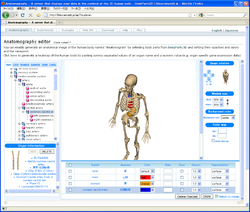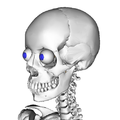Anatomography
  | |
| Available in | English or Japanese |
|---|---|
| Owner | Database Center for Life Science |
| Created by | Kousaku Okubo |
| URL | lifesciencedb.jp/bp3d |
| Commercial | No |
Content license | CC-BY-SA 2.1-ja[1] |
Anatomography is interactive website which supports generating anatomical diagrams and animations of human body. Anatomography website is maintained by DBCLS (Database Center for Life Science), non-profit research institute located at the University of Tokyo. Anatomical diagrams generated by Anatomography, and 3D polygon data used in the site (called BodyParts3D), is freely available under the Creative Commons Attribution-ShareAlike license.[1]
Description
Anatomography was launched at Feb. 9, 2009.[2] Originator and chief director is Kousaku Okubo (大久保 公策), professor at DDBJ of National Institute of Genetics.
Human body polygon data used in the site is called "BodyParts3D".[3] BodyParts3D polygon data is extracted from whole human body MRI images. The whole human body MRI images which BodyParts3D is based on is "TARO" and "HANAKO".[4] "TARO" and "HANAKO" are 2mm * 2mm * 2mm voxel data of human male and female body, created by National Institute of Information and Communications Technology.[5] TARO and HANAKO were published freely at November, 2004.[6][7]
Diagrams from Anatomography is used, for example, Canadian science TV show Le code Chastenay,[8] Internet encyclopedia Wikipedia, lecture materials at universities, twitter, and so on.[9] Anatomography chooses Creative commons license. Its basic reason is to widen usage and to democratize medical knowledge. About usage of Anatomography on websites like Wikipedia and Wikimedia Commons, developers say "spreading of usages by anonymous users on like Wikipedia and Wikimedia Commons is what we had expected."[9]
Some tutorial videos are available on YouTube.[10]
Additional images
-
Heart and its blood vessels.
-
Skull and eyes.
-
Downloaded BodyParts3D polygon data, edited with Blender.
-
Chief director Kousaku Okubo at conference[11]
See also
References
- ^ a b FAQs - credit. (in Japanese) DBCLS. Retrieved 2012-10-12.
- ^ Release notes (in Japanese). DBCLS. Retrieved 2012-10-12.
- ^ Nobutaka Mitsuhashi, Kaori Fujieda, Takuro Tamura, Shoko Kawamoto, Toshihisa Takagi and Kousaku Okubo "BodyParts3D: 3D structure database for anatomical concepts" Nucleic Acids Research, 2009, Vol. 37, Database issue D782-D785 PMID 18835852 PMC 2686534

- ^ Taro and Hanako is common given names for males and females in Japanese, like John and Jane in English.
- ^ Nagaoka T, Watanabe S, Sakurai K, Kunieda E, Watanabe S, Taki M, Yamanaka Y. "Development of realistic high-resolution whole-body voxel models of Japanese adult males and females of average height and weight, and application of models to radio-frequency electromagnetic-field dosimetry." Phys Med Biol. 2004 Jan 7;49(1):1-15. PMID 14971769
- ^ 日本人の数値人体モデルDB「TARO」と「HANAKO」公開 2004/11/10 (in Japanese). ITMedia. Retrieved 2012-10-12.
- ^ 報道発表:日本人平均成人男女の数値人体モデルデータベース公開のお知らせ 2004-11-10 (in Japanese). National Institute of Information and Communications Technology. Retrieved 2012-10-12.
- ^ 「LE CODE CHASTENAY」Emission 48, 2010-01-19 aired
- ^ a b 三橋 信孝、藤枝 香、今井 紫緒、武藤 勇、田村 卓郎、川本 祥子、高木 利久、大久保 公策 「BodyParts3DとAnatomography: 医学での情報共有を「動機付ける」素材」Template:Ja icon シンポジウム「ライフサイエンスの未来へ~10年先のデータベースを考える~」/ Nobutaka Mitsuhashi, Kaori Fujieda, Shio Imai, Isamu Muto, Takuro Tamura, Shoko Kawamoto, Toshihisa Takagi and Kousaku Okubo "BodyParts3D and Anatomography: Materials motivating sharing information in medicine" Poster presentation at "Symposium: Toward the Futere of Life Science - Thinking Databases of 10 Years Later" held in the University of Tokyo at 2010-10-05. Retrieved 2012-10-12.
- ^ Kawano S, Ono H, Takagi T, Bono H. "Tutorial videos of bioinformatics resources: online distribution trial in Japan named TogoTV." Brief Bioinform. 2012 Mar;13(2):258-68. PMID 21803786 PMC 3294242

- ^ Conference "Balancing IP Protection and Data Sharing in Science" held at the University of Tokyo, 2009-10-05. "Conference program (partly Japanese, partly English)". Okubo's presentation is Japanese just before Lawrence Lessig's lecture. Entire video of each lectures are available by clicking links.
External links
- Anatomography
- How to use BodyParts3D/AnatomographyTemplate:Ja icon on YouTube - Lecture by Kaori Fujieda, developer of Anatomography.
- Database Center for Life Science




![Chief director Kousaku Okubo at conference[11]](/upwiki/wikipedia/commons/thumb/d/d3/Dr_ohkubo.png/120px-Dr_ohkubo.png)